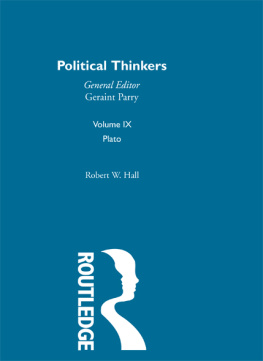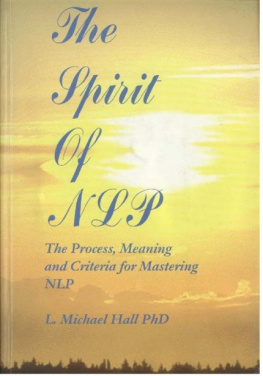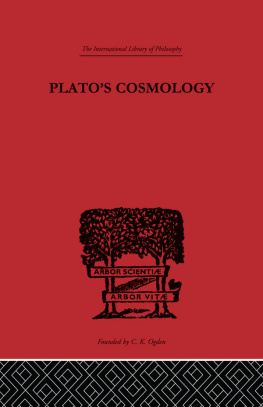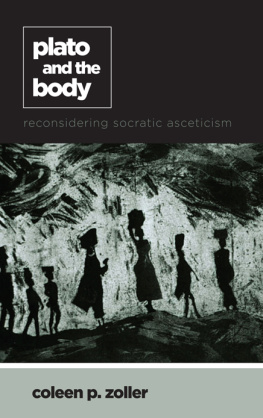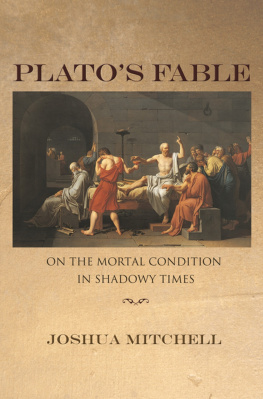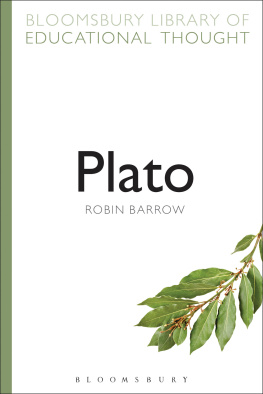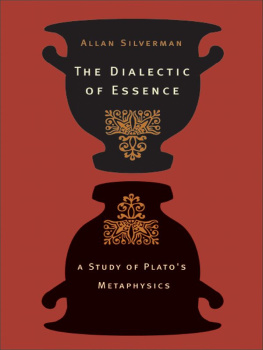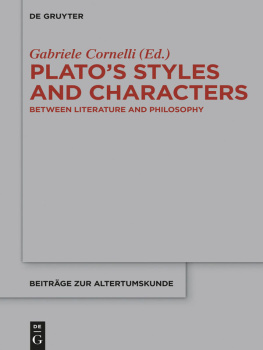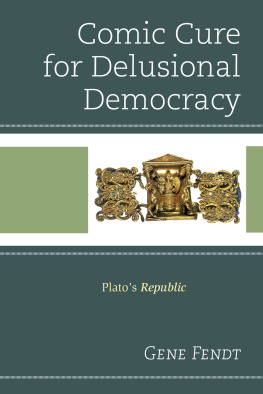POLITICAL THINKERS
POLITICAL THINKERS
VOLUME I
Hegel
Raymond Plant
VOLUME II
Edmund Burke: His Political Philosophy
Frank OGorman
VOLUME III
Karl Marx
Michael Evans
VOLUME IV
John Stuart Mill
R.J.Halliday
VOLUME V
Bentham
James Steintrager
VOLUME VI
Hobbes: Morals and Politics
D.D.Raphael
VOLUME VII
Aristotle
John B.Morrall
VOLUME VIII
John Locke
Geraint Parry
VOLUME IX
Plato
Robert W.Hall
POLITICAL THINKERS
General Editor: Geraint Parry
Volume IX
Plato
Robert W.Hall

LONDON AND NEW YORK
First published 1981
by Routledge
This edition published 2004
by Routledge
2 Park Square, Milton park, Abingdon, Oxon, OX14 4RN
Simultaneously published in the USA and Canada
by Routledge
270 Madison Ave, New York NY 10016
Routledge is an imprint of the Taylor & Francis Group
This edition published in the Taylor & Francis e-Library, 2004.
To purchase your own copy of this or any of Taylor & Francis or Routledges collection of thousands of eBooks please go to www.eBookstore.tandf.co.uk.
1981 Robert W.Hall
All rights reserved. No part of this book may be reprinted or reproduced or utilised in any form or by any electronic, mechanical, or other means, now known or hereafter invented, including photocopying and recording, or in any information storage or retrieval system, without permission in writing from the publishers.
British Library Cataloguing in Publication Data
A catalogue record for this book is available from the British Library
ISBN 0-203-33492-2 Master e-book ISBN
ISBN13: 978-0-203-33492-8 Master e-book ISBN
ISBN13: 978-1-134-33918-1 ePub ISBN
ISBN 0-415-32682-6 (set)
ISBN 0-415-32691-5 (volume IX)
Publishers note
The publisher has gone to great lengths to ensure the quality of this reprint but points out that some imperfections in the original book may be apparent.
PLATO
Robert W.Hall
Professor of Philosophy, University of Vermont
London
GEORGE ALLEN & UNWIN
Boston Sydney
CONTENTS
Dedication
To my wife, Mary, and our children, Christopher,
Jonathan, Pamela, Timothy, Jennifer and Nicholas,
with love and affection
PREFACE
This study does not deal with the political thought of the historical Socrates as found in the Apology and Crito. References to Socrates are usually to the Platonic Socrates who as Platos spokesman may reflect views that agree with those of the historical Socrates.
I am grateful to Professor Geraint Parry of the University of Manchester for his careful reading of my manuscript and for his helpful comments. Leslie Weiger and Carolyn Besaw provided expert secretarial assistance in deciphering a recalcitrant text, for which I am deeply indebted. The editors of the Journal of the History of Philosophy have kindly granted permission for me to use portions of my article Platos political analogy: fallacy or analogy (vol. XII, no. 4, 1974). Finally, I wish to thank the Institutional Grants Committee of the University of Vermont for its support of research resulting in this book.
Chapter 1
The Athenian Democracy
Plato was born in 427 BC into a noble and wealthy family, a circumstance usually guaranteeing a successful career in politics. He did not play the expected political role, however, because of his dislike of prevailing conditions in Athens. Prior to his birth Athens had evolved into a powerful democratic state with a bustling economy and a continually increasing trade. The principal factor in the rise of Athens was her navy, which was the largest and strongest in the Greek world. For glory and profit Athens gradually transformed the defensive Delian League of Greek states into her empire. A desire for more power, more influence and more trade brought Athens into a collision course with the land-based power of Sparta in 431 BC in the great Peloponnesian war. The Spartans were naturally conservative and content with the status quo, but they finally became alarmed at the seemingly endless Athenian thirst for power and expansion and decided on war to curb Athens growth (Thucyd., I, 23, 6). (For a different view that takes issue with this standard interpretation cf. de Ste. Croix, 1972, esp. pp. 2902.)
Plato saw the war and Athens eventual defeat in 404 BC as a sign of her inadequacy to meet the political, moral and spiritual needs of the people. What Plato viewed as a decline in values was due to the cynicism and desire for immediate gratification that was, in part, brought on by the sufferings and deprivations the Athenians experienced in the war. But it was also attributed to earlier movements of thought that presented a world view that was scientific or naturalistic in providing explanations of the nature of the world and its processes that avoided any reference to teleology or the action of the gods. Plato believed such a naturalistic world view was responsible for the development of a moral relativism that denied any absolute or unchanging standards of morality and society. Society was based not on nature, but on an implicit recognition by men that organized social existence was necessary for their survival and advancement. The prevalence of these views around him and the decline of values they caused was a prime factor in Platos development as a political and moral thinker.
Platos exposure to Socrates was a second influence that shaped his life from his youth. Plato took up the search for universal moral values which Socrates never succeeded in finding. The execution of Socrates in 399 by the restored democracy, like the excesses of the Thirty after the Peloponnesian war, had much to do with Platos decision not to undertake the political career which beckoned him as a wealthy and wellborn youth. Instead he turned inward to speculation and developed in the dialogues the theory of forms, that notion of an eternal intelligible world which contained within it certain unchanging and perfect moral and political ideals which could serve as models. To implement his educational and political goals, Plato founded his famous academy while he was still fairly young in the early years of the fourth century. Enduring for some 900 years, the academy was a center for the training of future political leaders of the cities of Greece. During the last two of his three visits to Sicily, Plato attempted to reproduce his ideals in Syracuse; he was unsuccessful because of the refusal of Dionysus, the tyrant of Syracuse, to follow his advice. Plato died in 347 BC.
The customary division of Plato's dialogues is threefold. The early dialogues reflect more of the thought of the historical Socrates and are exercises in elenchus or refutation. The middle group of dramatic dialogues presents Socrates as the chief speaker but their content goes beyond the interests and concerns of the historical Socrates. Finally in the late dialogues the dramatic element largely disappears, and the chief speaker is someone other than Socrates. The late dialogues are occupied chiefly with critical discussion of method and a painstaking and subtle analysis of logical and epistemological problems; as well as, in the case of the Politicus and the Laws, an extensive analysis of political and constitutional matters.

